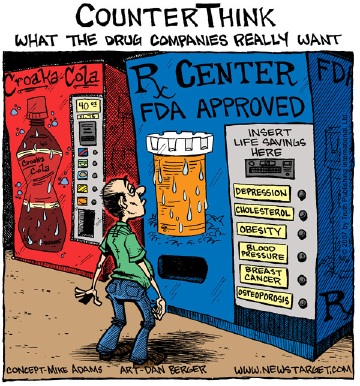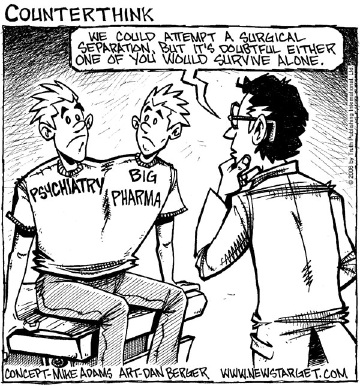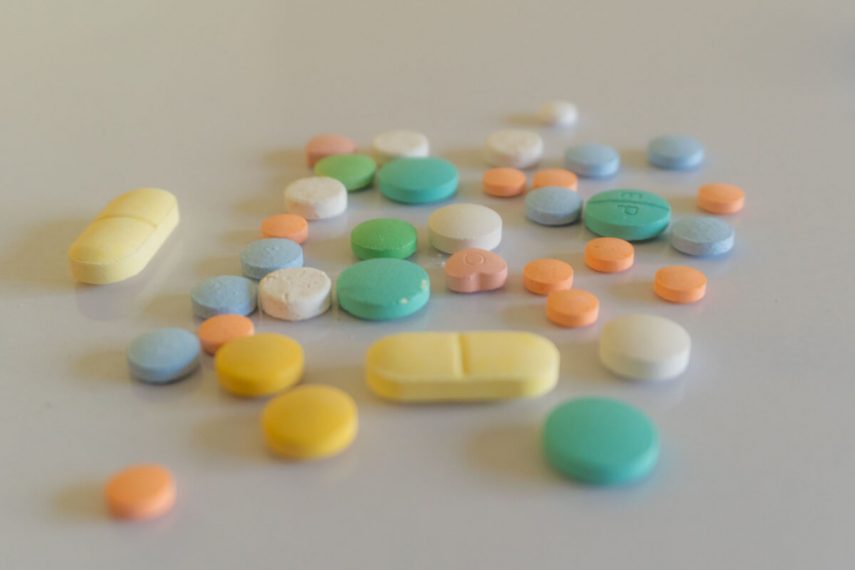So you've given meds a good trial run.
You felt a little better within weeks but now you feel just like you used to.
What gives?
As you discovered, medications might be a good quick fix - but the relief is temporary and besides "what with this numb feeling?"
Medications won't "cure" the problem
Yes, medications can sometime provide temporary relief of symptoms. However, in my view, they cause more problems than not, particularly for anyone who wants a "cure".
The main reason is that medications restrict the amount of learning your nervous system can do.
That's because they artificially restrict the range at which your nervous system operates.
In the end, it means you either take them forever - and forfeit your innate ability to feel whole and alive - or find an alternative.
In my view, that alternative is in getting your nervous system to regulate.
Questioning Medications
Several things seem apparent:
- Clients do not have access to unbiased information about the risks and benefits of medications;
- The threshold for access to meds is too low, with the result that they're being over-prescribed;
- Alternatives are not investigated and long-term pharmaceutical usage is tacitly condoned, if not encouraged.
- Research on pharmaceuticals is problematic; and finally,
- The "medicalization" of mental health problems creates an artificial need for meds, when they could be better solved in other ways.
Pharmaceuticals do have a place.
In instances where there is little chance of getting good therapy, they have helped some to feel more settled with a greater feeling of control over their emotions.
They've even made it easier for some to enter therapy.
Yet for the most part, they tend to blunt the effectiveness of the therapeutic relationship, and thus its potential for creating change.
Too many folks are caught in an endless cycle of medications that no longer help. Unfortunately they often feel helpless to find alternatives.
Medications are prescribed without considering therapy
Pharmaceuticals are often promoted with the implication that there are no alternatives.
Many folks have complained to me how their doctor only offered one solution to their troubles: medication. Counseling is rarely put forth as an option.
Yet, counseling is a practical and effective choice for folks especically for those who do not wish to take medications or who hope to eventually dispense with their meds.
There are also alternatives to medications that encourage individuals to take personal responsibility for their healthcare (e.g. homeopathy, naturopathic).
Can't decide whether to go on medication?
It can't be easy. The decision to take medication treatment is a personal one. No one but you can fully appreciate what particular circumstance or internal distress motivates your decision to use, or not use medications.
If you are currently on medication or are planning to begin, please understand that it is not my intention to dissuade or disparage your decision. You should never feel you have to apologize or explain your need for medication.
I have prepared a short list of links to sites and articles that offer alternative views from that promoted by the pharmaceutical industry. Included in this list are sites that help visitors understand the benefits as well as the side effects of medications. The opinions expressed on all sites are not necessarily those of myShrink, however.
More harm than good?
Peter Gøtzsche: "...it takes only a few extra days for depression in the placebo group – given dummy pills – to lift as much as in the group given the drugs." (2015)
You'll get a laugh out of this little video.
HEADLINE: "FDA Approves Depressant Drug..."
Making the Case Against Antidepressants
By Rober Whitaker. Good news...people are waking up!
Caution Advised for Antipsychotic Drugs
A major drug study revealed that the new best selling drugs - they happen to be two antipsychotic drugs - are not any better than the older ones. Plus, there seems to be some serious side effects that were not being made well known.
And by the way, the use for these drugs increased from 54 million in 2011 from 28 million in 2001....uhm. (New York Times, 2012)
Ritalin Gone Wrong
"...the illusion that children’s behavior problems can be cured with drugs prevents us as a society from seeking the more complex solutions that will be necessary. Drugs get everyone — politicians, scientists, teachers and parents — off the hook. Everyone except the children, that is. " L. Alan Sroufe, New York Times
Where has all the psychotherapy gone?
The American Psychological Associations lament on the decreasing use of psychotherapy owing to the dramatic rise in "medication only" treatments. Twice as much money is being spent on consumer advertising than on research and development. Katherine C. Nordal, APA Perspectives, November, 2010.
SSRIs in Pregnancy Hike Risk of Heart Defects
They followed over half a million Danish women taking SSRI's. One SSRI during pregnancy increased the risk in septal heart defects in babies by an odds ratio of 1.91 and taking multiple SSRI's increased that risk five fold. (MedPage Today, September 25, 2009.)
Fuzzy Relationships: Influential Psychiatrist Didn't Report $1.2 M Drug Makers Pay
It'd be tempting to think this was the actions of just one bad apple. But given the history of the pharmaceutical industry (as described below) I think not. This is the calculated strategy of a huge industry that feels free to manipulate research results and delude consumers and health care professionals. (New York Times Oct. 4/08 article)
Do Antidepressants Really Work?
You'll enjoy IronShrink's brief introduction on the question of antidepressant usage. Dr. Shawn Smith aka IronShrink has a flare for pointing out the obvious.
(March 9, 2008)
Psychotherapy: A cost-effective choice over medications?
This article reviews some research on the cost-effectiveness of psychotherapy vs. drug treatment for depression. When you factor in all the costs (ie. side effects, relapse rates, and duration of relief), treating disorders exclusively with drugs is not economically justifiable. (APA Monitor, January, 2000)
Integrating psychotherapy and pharmacotherapy: Myths and the missing link (2006) PDF Form
This is a hard-hitting article on some common distortions in the way research results are reported by the pharmaceutical industry. Authors Jacqueline Sparks, Barry Duncan and Scott Miller review three major studies and expose the "evidenced-based" problems of drug research.
"We recommend that the medical model, as it gains ever more momentum in our field, be questioned for its assumptions, method, and implications. We call for recognition of the fact that psychiatric drug therapy is a profit-driven industry, built on questionable science."

What the drug companies really want.
Mike Adams from Natural News is a champion of holistic causes. In this short piece he explains that the cartoon above isn't too far off.
Antidepressant Medications in Children and Adolescents
Looking for unbiased information on pharmaceuticals? Therapeutic Initiatives is a university-based organization that provides objective opinion on "evidence based" drug information to medical practitioners and pharmacists on "rational drug use" (they emphasize it is not "evidence biased" information). This is a revealing report on medication use in young people.
TeenScreen
Apparently there are 8 million children in the USA on psychiatric drugs. Here's one of the ways that drug companies lure young people into getting their parents' consent.
Are you a Pharma Junkie?
For a chuckle, take this short quiz from the UK division of No Free Lunch and find out if you're an addict.
A Disease for Every Pill
Authors Ray Moynihan (editor of British Medical Journal) and Alan Cassels (pharmaceutical policy researcher of the University of Victoria) expose pharmaceutical advertising tactics in this enlightening article published in The Nation (Oct. 17, 2005).
Peter R. Breggin M.D.
Dr. Breggin is a hero to many. For decades he has warned the public--and health professionals--of the potential side effects of drugs, electroshock therapy, psychosurgery and involuntary treatment.
Author of several books, he has also served as an expert witness in numerous lawsuits, which has given him access to the in-house research files of the largest pharmaceutical companies. Fortunately for us he has made his findings public.
Greenspiration
Tooker Gromberg was an amazing man. I never knew him but his legacy lives on in the hearts of his supporters. This site showcases the "Depression Expression: raising questions about antidepressants", a PDF document filled with factual gems. For example, did you know that advertising prescription drugs is illegal in most countries in the world, except for the USA and New Zealand?
Worst Pills
Worst Pills is operated by US-based Public Citizen, a non-profit consumer interest group. Their primary focus is on banning or re-labelling unsafe or ineffective drugs and encouraging greater transparency and accountability in the drug approval process.
Their searchable database of over 500 medications lists those that are known to have a high risk and/or insufficent research to back up their claims.
Drug vs.Talk Therapy for Depression
Consumer Report Survey Shows Antidepressants' Side Effects More Common Than Package Labels Indicate.
"...one appears to work faster, while the other may be more effective," says author Jeanie Lerche Davis, Sept. 7, 2004.
Talk Therapy Is Sometimes Best for Depression
WebMD: Drugs Aren't the Only Effective Treatment, Study Shows: April 4, 2005 --
"New research challenges the widely accepted idea that drugs are the only effective initial treatment for major depression." This news item was based on an article published in the Archives of General Psychiatry.

The Resignation of Dr. Loren Mosher
Dr. Mosher, another hero, boldly resigned from the American Psychiatric Association in protest for what he feels is his profession's collusion with the pharmaceutical industry.
Loren R. Mosher, M.D., Former official of National Institute of Mental Health (NIMH)
Letter of Resignation to the American Psychiatric Association (excerpts):
"There is neither a blood test nor specific anatomic lesions for any major psychiatric disorder... Is psychiatry a hoax - as practiced today? Unfortunately, the answer is mostly yes."
Letter to the President of the American Psychiatric Association:
"After nearly three decades as a member it is with a mixture of pleasure and disappointment that I submit this letter of resignation from the American Psychiatric Association. The major reason for this action is my belief that I am actually resigning from the American Psychopharmacological Association...
At this point in history, in my view, psychiatry has been almost completely bought out by the drug companies. The APA could not continue without the pharmaceutical company support of meetings, symposia, workshops, journal advertising, grand rounds luncheons, unrestricted grants etc. etc. Psychiatrists have become the minions of drug company promotions....
Psychiatric training reflects their influence as well; i.e., the most important part of a resident's curriculum is the art and quasi-science of dealing drugs, i.e., prescription writing...We condone and promote the widespread overuse and misuse of toxic chemicals that we know have serious long term effects -- tardive dyskinesia, tardive dementia and serious withdrawal syndromes....
Finally, why must the APA pretend to know more than it does? DSM IV [Diagnostic and Statistical Manual] is the fabrication upon which psychiatry seeks acceptance by medicine in general. Insiders know it is more a political than a scientific document... The issue is what do the categories [diagnoses] tell us? Do they in fact accurately represent the person with a problem? They don't, and can't, because there are no external validation criteria for psychiatric diagnoses. There is neither a blood test nor specific anatomic lesions for any major psychiatric disorder. So where are we? APA as an organization has implicitly (sometimes explicitly as well) bought into a theoretical hoax. Is psychiatry a hoax - as practiced today? Unfortunately, the answer is mostly yes...."
Loren R. Mosher, M.D.
Training Daze - Why do doctors fixate on diagnosis, not treatment?
This article by Darshak Sanghavi examines an issue that is only recently coming to light. Too little attention is being paid by physicians on treatment. There are longstanding issues related to this pattern. And a major source of treatment information tends to promote pharmaceuticals over behavioural or lifestyle changes.
The Politics of Psychiatry
The Decline Effect and the Scientific Method: The New Yorker
Across a number of diciplines including psychology, the replicability of scientific studies is declining. Is it related to a recent finding that the efficacy of antidepressants have decreased dramatically from the 50's? Is the 5% statistical error too lenient? Is there still too much bias by the scientists undertaking their studies? Are sceintific journals reluctant to publish studies that are against the prevailing paradigm?
"We like to pretend that our experiments define the truth for us. But that’s often not the case. Just because an idea is true doesn’t mean it can be proved. And just because an idea can be proved doesn’t mean it’s true. When the experiments are done, we still have to choose what to believe." Jonah Lehrer
The Creation of Prozac
From the Public Library of Science Journal news has reached us that prozac and other similar antidepressants are no more beneficial than a placebo. Why did this result make headlines when other equally compelling reports have not?
Well, apparently, drug companies have only been publishing 10% of their studies. It is now a legal obligation in the UK for them to do so. Therefore, this report includes data from drug companies. An interesting read.
The author, Darian Leader also points to a cozy relationship between CBT and medication research both of which appear to emphasize short-term symptom relief at the cost of a long term solution. (The Guardian, Feb. 27, 2008.)
Antidepressants Facts, The Truth about Psychiatry Depression
This video highlights, rather graphically, how we're being duped by the big pharma advertising empire. The author is rather sensationalistic in the points he makes however he backs up his claims with research - some of which I have posted on these pages.
Related Topics
Blogs of Interest
Blogs are often posted anonymously and the accuracy of the information can't always be counted on. However, these blogs show promise.
Clinical Psychology
PharmaGossip
Books for a Deeper Analysis
Selling Sickness
How the World's Biggest Pharmaceutical Companies Are Turning Us All into Patients. Ray Moynihan and Alan Cassels. I think the title says it all. Well worth reading.
Caution!
I strongly suggest that your decision to go on (or off) your meds be made in consultation with your health care practitioner. There are side effects for either decision and it's a good idea to be aware of what to expect and what precautions you need to take.
After careful consideration and with the help of your physician and/or health care provider you have decided to come off your medication, I suggest doing so under his or her supervision. This way you have a team approach to your health care. No one need do this alone.
Withdrawal from many psychiatric drugs can sometimes result in serious emotional and physical reactions. The side effects for coming off can make you feel much worse and while this may be a temporary situation, coming off slowly is the best solution.
In short, not only might there be problems starting a psychiatric drug treatment (i.e. side effects), but it can also be hazardous to stop taking them.
(For more information read: Many Suffer from Antidepressant Withdrawal)
From the BBC here's a transcript from a show on the potential withdrawal effects of Paxil: The secrets of seroxat (the name of paxil in Britain).
Conclusion: withdrawal from psychiatric drugs should be done ONLY under clinical supervision!
References:
Antidepressant Discontinuation Syndrome by Donald S. Robinson, MD


